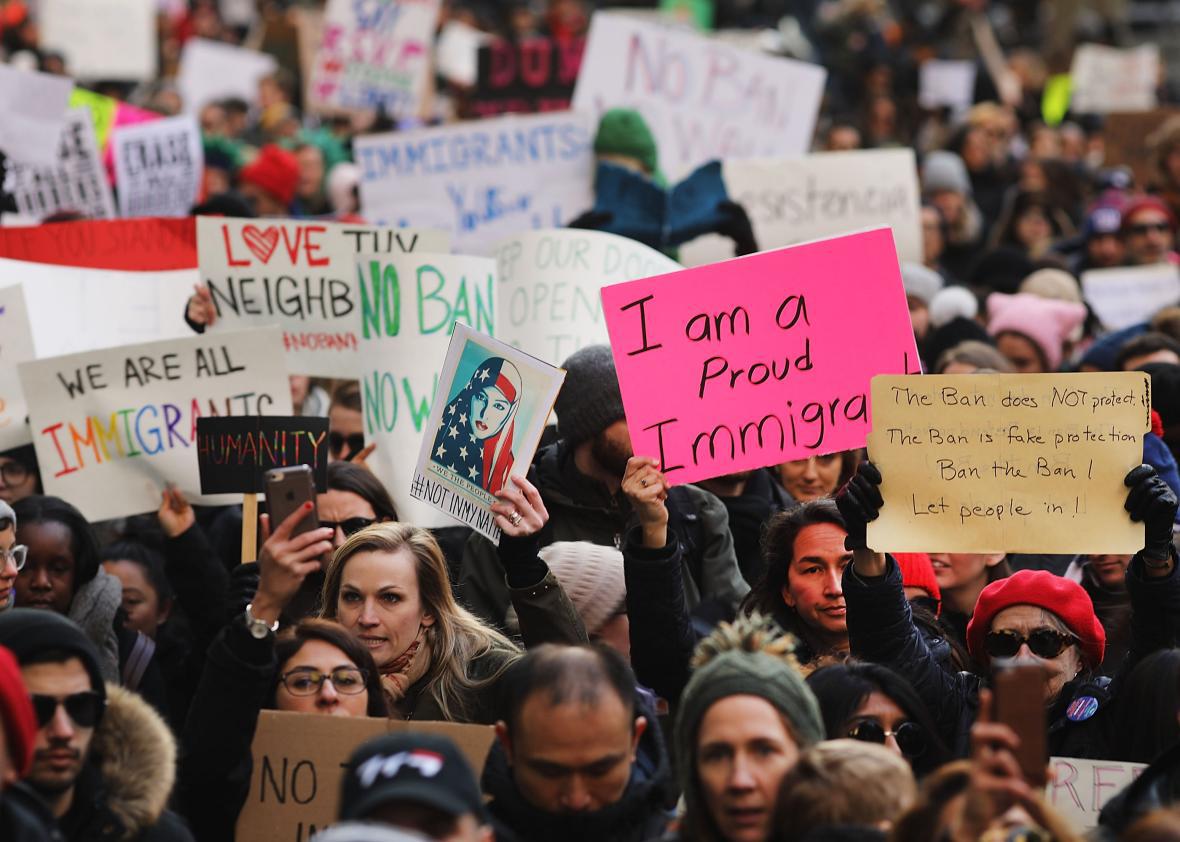A government attorney announced in court on Friday that more than 100,000 visas have been revoked because of Donald Trump’s Muslim ban. (The State Department later lowered that number to 60,000.) The attorney also acknowledged that these visas were permanently canceled, not temporarily suspended. This new information is sure to factor into many of the existing lawsuits challenging the ban’s constitutionality. But it is especially pertinent to those suits filed on behalf of U.S. citizens and lawful permanent residents whose spouses were denied entry into America because of Trump’s ban. Indefinitely excluding an American’s spouse from the country for no legitimate reason raises grave constitutional concerns. And our new understanding of the scope of the ban suggests it violates thousands of Americans’ marriage rights.
As the Supreme Court recently reiterated, marriage is a fundamental right under the U.S. Constitution, one that the government cannot arbitrarily interfere with. But this right isn’t limited to the mere issuance of a marriage license; it encompasses the right to “establish a home and bring up children.” Thus, when the government limits the right of a married couple to “establish a home”—that is, live together—it infringes upon a constitutionally protected liberty interest. And when the government encroaches upon a liberty interest, the Due Process Clause requires that it provide a permissible justification and comport with procedural safeguards.
In 2015, the Supreme Court applied these principles in Kerry v. Din, a case that is somewhat analogous to the situation today. Fauzia Din, a U.S. citizen, had sponsored an immigrant visa for her husband, Kanishka Berashk, an Afghan citizen living in Afghanistan. The government denied the visa to Berashk, citing his participation in “terrorist activities.” Din sued, alleging a violation of her constitutional right to live with her spouse.
Although the court splintered badly, six justices at least assumed that, in denying Berashk’s visa, the government had breached Din’s protected liberty interests. The controlling opinion, written by Justice Anthony Kennedy, focused on the process the government owed to Din in denying her husband a visa. Kennedy held that the government’s actions were acceptable because it had provided a “facially legitimate and bona fide reason” for its decision—Berashk’s connection to “terrorist activities.” (He had worked for the Taliban government, albeit in a minor capacity.) Because the government had sufficiently justified its exclusion of Berashk, Kennedy explained, it had provided Din with the “process” she was “due.”
Trump’s executive order does not comply with these due process requirements or even pretend to do so. It instantly canceled tens of thousands of visas for no reason other than a dubious fear of “radical Islamic terrorists”—and, as he has previously admitted, Muslims themselves. These cancellations do not even try to provide a “facially legitimate and bona fide reason” for excluding visa-holders from the U.S. They are deeply arbitrary and capricious, motivated by illegitimate animus, unadorned by even the pretextual dressings of due process. As such, they fail to meet the standard laid out in Din. And as a result, spouses of visa-holders who are now indefinitely barred from the U.S. should be able to sue to restore their partners’ ability to enter the country.
These spouses, of course, aren’t the only people who can sue to block Trump’s ban. His instant cancellation of myriad visas would seem to violate a federal statute governing the revocation of immigration visas, which lays out explicit guidelines that Trump openly flouted. And the entire executive order should ultimately be struck down as an unconstitutional effort to discriminate against Muslims, rendering its attack on visa-holders—as well as those in the process of obtaining visas—legally invalid. But for now, every suit against the order helps courts, and the public, understand the scope of its attempt to undermine the Constitution. And Americans whose spouses are suddenly excluded from the country have a right to demand that the government explain its actions—and give a better answer than a raw hatred of Muslims.
